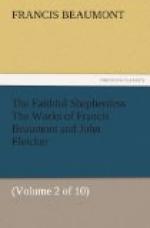(E) The | Faithfull | Shepherdesse. | Acted at Somerset | House, before the King and | Queen on Twelf night | last, 1633. | And divers times since, with great ap- | plause, at the Private House in Black-| Friers, by his Majesties Servants. | Written by John Fletcher. | The Fourth Edition. | London, Printed for Ga. Bedell and Tho. Collins, at the Middle | Temple Gate in Fleet-street. 1656.
(F) The | Faithfull | Shepherdesse. | Acted at | Somerset-House, | Before the King and Queen on Twelfth Night, 1633. | And divers times since, with great | Applause, at the Private House in | Black-Friers, by his Majesties | Servants. | Written by John Fletcher. | The Fifth Edition. | London, | Printed for G. Bedell and T. Collins, at the Middle | Temple-Gate in Fleet-street, 1665.
The verso of the title-page bears the date March 3,
166-4/5.
Licensed,
Roger L’Estrange.
As neither the Second Folio nor the Quartos print
any list of the
Characters it may be as well to give one here.
Perigot. Old Shepherd.
Thenot Priest of Pan.
Daphnis. God of the River.
Alexis. Satyr.
Sullen Shepherd. Shepherds.
Clorin. Cloe.
Amoret. Shepherdesses.
Amarillis.
Scene: Thessaly.
The following Dedicatory Verses were omitted from the Second Folio.
To my lov’d friend M. John Fletcher, on his Pastorall.
Can my approovement (Sir) be worth your thankes?
Whose unkn[o]wne name and muse (in swathing clowtes)
Is not yet growne to strength, among these rankes
To have a roome and beare off the sharpe flowtes
Of this our pregnant age, that does despise
All innocent verse, that lets alone her vice.
But I must Justifie what privately,
I censurd to you: my ambition is
(Even by my hopes and love to Poesie)
To live to perfect such a worke, as this,
Clad in such elegant proprietie
Of words, including a mortallitie.
So sweete and profitable, though each man that heares,
(And learning has enough to clap and hisse)
Arives not too’t, so misty it appeares;
And to their fi1med reasons, so amisse:
But let Art looke in truth, she like a mirror,
Reflects [Reflect, C, D] her comfort [consort, D—F],
ignorances terror.
Sits in her owne brow, being made afraid,
Of her unnaturall complexion,
As ougly women (when they are araid
By glasses) loath their true reflection,
Then how can such opinions injure thee,
That tremble, at their owne deformitie?
Opinion, that great foole, makes fooles of all,
And (once) I feard her till I met a minde
Whose grave instructions philosophical),
Toss’d it [is, F] like dust upon a march strong
winde,
He shall for ever my example be,
And his embraced doctrine grow in me.
His soule (and such commend this) that commaund [commands,
D, E, F]
Such art, it should me better satisfie,
Then if the monster clapt his thousand hands,
And drownd the sceane with his confused cry;
And if doubts rise, loe their owne names to cleare
’em
Whilst I am happy but to stand so neere ’em.




